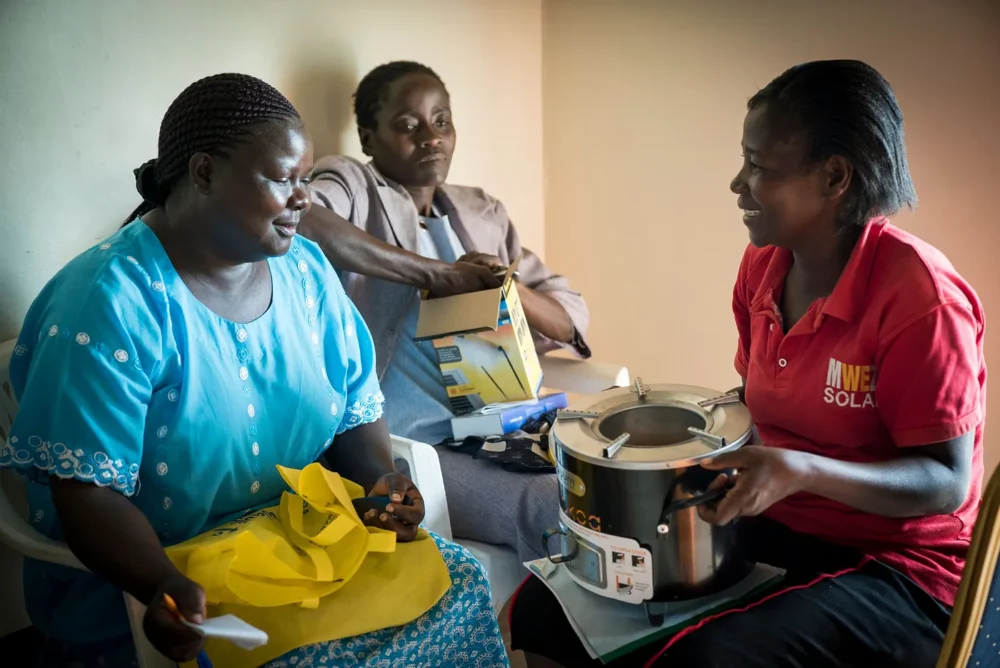Interview with Calum Watkins, participant, Efficiency for Access Design Challenge 2019–2020
Since his participation in the Challenge, Calum started working as a graduate engineer at Smarter Grid Solutions. In this interview, he discusses ‘e-Cook for developing countries’, what he learnt through participating in the Efficiency for Access Design Challenge, which is funded by UK aid and the IKEA Foundation, and his job. Read on to find out more

By Sarah Hambly
Calum and his teammates, Wei-Wen Tan, Iain Wright, Elliot Wilson, proposed ‘eCook for developing countries’, an affordable and user-friendly solar powered electric cooking device, which could be used to cook food instead of open fires. The cooker relied on low power diode electric heating technology that allows users to monitor energy use. It also had a simple, robust construction and energy efficient insulated design, which is easy to maintain. In addition, the team proposed an affordable financing model to make the product accessible to low-income users.
Since his participation in the Challenge, Calum started working as a graduate engineer at Smarter Grid Solutions. In this interview, he discusses ‘e-Cook for developing countries’, what he learnt through participating in the Efficiency for Access Design Challenge, which is funded by UK aid and the IKEA Foundation, and his job. Read on to find out more.
As part of one of the University of Strathclyde’s teams, you won silver for your project ‘e-Cook for developing countries’. Could you please tell us more about your project?
Our project developed a low energy, robust prototype and business model for deploying a DC diode electric cooker with a social enterprise in Zambia called Zayohub. Our team used this project as the master’s project for our degree and built on the findings of others to develop our novel cooking design. Aside from the prototype design, we conducted market research and cooking tests for typical foods. From a student perspective, it was great to participate in a larger research team (the Modern Energy Cooking Services group) which is addressing the real needs of rural African communities. Although we weren’t able to complete our design with the pandemic interrupting our progress, the learning experience was invaluable and a new team will take over in the coming year.
What did you learn from participating in the Efficiency for Access Design Challenge?
The competition was a fantastic opportunity to network and connect with experts in the sector and access resources. I really enjoyed the webinar series throughout the year that focused on various technologies and challenges. In the lead up to the competition final, it was also good to chat with our competition mentor and professionals in the industry. When the final presentations were given, I was amazed by the diverse range of ideas from other teams to solve various global development challenges.

What advice would you give students participating in the 2020–2021 Challenge?
I would encourage students to make the most of the resources available, whether it be the webinars, website links or 1–2–1 mentoring opportunities. The designs that you create may not do everything you’d hoped for, but every effort is a step towards greater access to better technology for those who need it most.
You recently started working as a graduate engineer at Smarter Grid Solutions. Could you please tell us more about your role?
Yes, I started in June 2020 and have been working from home so far which has been a different experience! My work so far has focused on developing solutions that enable renewables to take up a greater share of the energy mix in the UK while avoiding expensive upgrades to the electrical infrastructure. This is a lot of crazy software that blows my mind on a daily basis! The team I work with are really great, even if I’ve not met most of them in person yet…
Did participating in the Challenge influence your decision to work in the sector?
I’ve worked on sustainable development projects through my university course for the last three years and these experiences definitely shaped my interests towards what I am doing now. Our company has started doing work on off-grid and micro-grid electrical systems which will be growing more and more as we seek to electrify more communities worldwide. It certainly gave me something interesting to talk about at the interviews!

What do you feel are the key challenges and opportunities in clean energy access today?
I think developing scalable, culturally-sensitive solutions must be done carefully in partnership with the communities they are for. This will help ensure that individuals and groups can feel a sense of ownership over new technologies. It’s a trade-off between efficiency gains from economies of scale, and what communities really need and can integrate into their current energy habits. For example, clean cooking is an aspiration for many, but a reality for few in developing countries and there are many intermediate steps needed to bring people to this point. Do I believe it can be done? Of course!